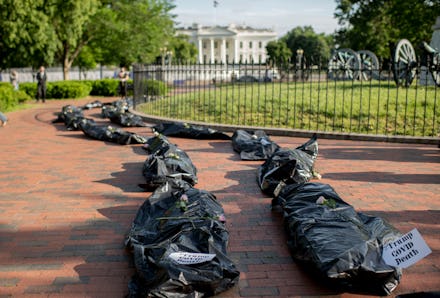Trump could've saved 36,000 lives if he acted 1 week earlier on coronavirus, per new modeling

As I write these words, America has suffered an estimated 90,000 coronavirus deaths (the real number is likely much higher) and is poised to cross the 100,000 death mark in the coming weeks, if not days.
That the Trump administration squandered precious time at the onset of this pandemic seems, at this point, to be without question. And now, as the death toll rises, and states nevertheless begin the medically inadvisable process of attempting a return to normalcy, a new study from Columbia University has shed light on what could have been, had America acted just one week earlier.
In "Differential Effects of Intervention Timing on COVID-19 Spread in the United States," authors Sen Pei, Sasikiran Kandula, and Jeffrey Shaman of Columbia's Mailman School of Public Health calculate that tens of thousands of lives could have been saved if social distancing measures and other "non-pharmaceutical interventions" had been enacted just one or two weeks earlier. Per the study:
We find significant reductions of the basic reproductive numbers in major metropolitan areas in association with social distancing and other control measures. Counterfactual simulations indicate that, had these same control measures been implemented just 1-2 weeks earlier, a substantial number of cases and deaths could have been averted. Specifically, nationwide, 61.6% of reported infections and 55.0% of reported deaths as of May 3, 2020, could have been avoided if the same control measures had been implemented just one week earlier.
To put that in more relatable terms: If social distancing measures and other local lockdown efforts had been put in place just one week before they actually began in mid-March, the study's modeling estimates some 36,000 lives could have been saved by the first week in May. Bump that theoretical headstart to two weeks, and the number jumps to 54,000 lives saved.
"It’s a big, big difference," Shaman told The New York Times this week. "That small moment in time, catching it in that growth phase, is incredibly critical in reducing the number of deaths."
The president, meanwhile, spent much of February and early March downplaying the severity of the viral outbreak. During a rally in Manchester, New Hampshire, in February, he bragged that "in April, you know, in theory, when it gets a little warmer, [the virus] miraculously goes away."
"I think it's going to work out good," he added. "We only have 11 cases, and they're all getting better."